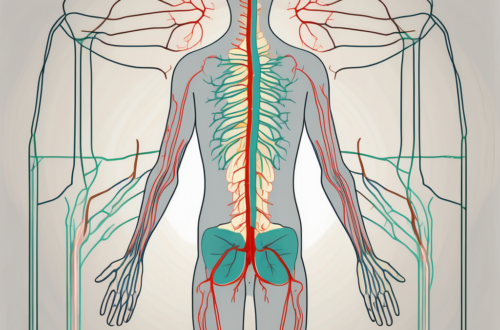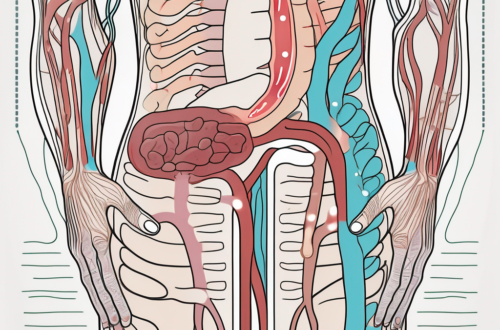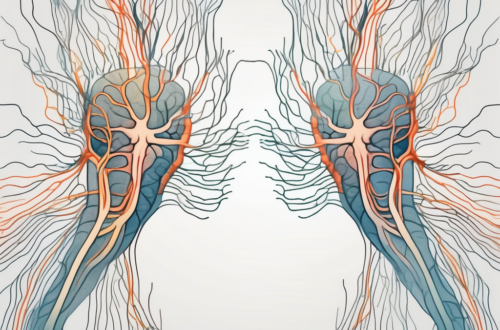The parasympathetic nerve plays a crucial role in our overall well-being, yet it is often overlooked when it comes to maintaining and enhancing our health. In this comprehensive guide, we will explore the various aspects of the parasympathetic nerve, its function in the body, and effective techniques to strengthen it. It is important to mention that while these strategies are generally beneficial, it is always recommended to consult with a medical professional before making any significant changes to your health routine.
Understanding the Parasympathetic Nerve
The parasympathetic nerve is one of the branches of the autonomic nervous system, responsible for regulating essential bodily functions such as digestion, rest, and relaxation. Often referred to as the “rest and digest” system, the parasympathetic nerve counterbalances the sympathetic nerve, which is responsible for the “fight or flight” response.
The parasympathetic nerve finely tunes the body’s internal environment, ensuring proper digestion, secretion, and elimination. It stimulates the production of digestive enzymes, increases blood flow to the digestive organs, and promotes the absorption of nutrients. Additionally, it helps regulate heart rate, respiratory functions, and glandular secretions.
The parasympathetic nerve plays a crucial role in maintaining the delicate balance of the body’s systems. It works in harmony with the sympathetic nerve to keep us functioning optimally. When we are in a state of rest and relaxation, the parasympathetic nerve takes over, allowing our bodies to focus on essential functions like digestion and restoration.
Imagine sitting down to enjoy a delicious meal. As you take your first bite, the parasympathetic nerve kicks into action. It signals the release of saliva, which helps break down the food in your mouth. Simultaneously, it stimulates the production of gastric juices in your stomach, preparing it to receive and digest the incoming food. The parasympathetic nerve also increases blood flow to the digestive organs, ensuring that they receive the necessary nutrients and oxygen to function optimally.
Not only does the parasympathetic nerve support digestion, but it also plays a vital role in promoting rest and relaxation. When we are in a state of calm, the parasympathetic nerve helps slow down our heart rate, allowing us to unwind and recharge. It also aids in regulating our respiratory functions, ensuring that we take slow, deep breaths, which have a calming effect on the body and mind.
Furthermore, the parasympathetic nerve influences glandular secretions, such as saliva, tears, and sweat. It helps maintain the moisture and lubrication of our eyes, mouth, and skin, contributing to our overall comfort and well-being.
The health of the parasympathetic nerve has a significant impact on our overall well-being. When this nerve is functioning optimally, we experience enhanced digestion, improved sleep quality, reduced stress levels, and better immune function. Conversely, a weak parasympathetic nerve can lead to digestive issues, poor sleep, increased stress, and a weakened immune system.
It is important to prioritize activities and practices that support the health of our parasympathetic nerve. Engaging in relaxation techniques such as deep breathing exercises, meditation, and gentle movement can help activate the parasympathetic response. Additionally, adopting a balanced and nutritious diet, getting enough sleep, and managing stress levels are all essential for maintaining the optimal functioning of the parasympathetic nerve.
The Science Behind Strengthening the Parasympathetic Nerve
Strengthening the parasympathetic nerve involves a multifaceted approach that encompasses both biological processes and lifestyle modifications.
The parasympathetic nerve, also known as the “rest and digest” system, is responsible for promoting relaxation, digestion, and overall homeostasis in the body. While its strength is partly determined by genetics, it is possible to influence its function through various means.
The Biological Process of Strengthening the Nerve
Engaging in activities that stimulate the vagus nerve, which is a major component of the parasympathetic nerve, can help enhance its strength over time. The vagus nerve, also known as the “wandering nerve,” is the longest cranial nerve in the body and plays a crucial role in regulating various bodily functions.
Deep breathing exercises, such as diaphragmatic breathing or alternate nostril breathing, have been shown to activate the vagus nerve and stimulate the parasympathetic response. By taking slow, deep breaths and focusing on the inhalation and exhalation, individuals can promote relaxation and activate the parasympathetic nerve.
In addition to deep breathing exercises, meditation has also been found to strengthen the parasympathetic nerve. Regular meditation practice can help reduce stress levels, promote mental clarity, and enhance overall well-being. By calming the mind and focusing on the present moment, individuals can activate the parasympathetic response and improve nerve function.
Acupuncture, an ancient Chinese practice, has also been shown to stimulate the parasympathetic nerve. By inserting thin needles into specific points on the body, acupuncturists can help restore balance and promote optimal nerve function. This traditional therapy has been used for centuries to treat various ailments and enhance overall health.
The Impact of Lifestyle on Parasympathetic Nerve Strength
Adopting a healthy lifestyle can significantly contribute to the strength of the parasympathetic nerve. Regular exercise, such as aerobic activities or strength training, has been shown to improve nerve function and promote overall well-being. Exercise increases blood flow, releases endorphins, and reduces stress, all of which can positively impact the health of the parasympathetic nerve.
A balanced diet rich in nutrients is also essential for maintaining optimal nerve function. Consuming foods high in vitamins, minerals, and antioxidants can support nerve health and promote overall well-being. Foods such as leafy greens, fruits, whole grains, and lean proteins provide the necessary nutrients for nerve repair and regeneration.
Adequate sleep is another crucial factor in maintaining the strength of the parasympathetic nerve. During sleep, the body repairs and rejuvenates itself, including the nervous system. Getting enough quality sleep allows the parasympathetic nerve to function optimally, promoting relaxation and overall well-being.
Additionally, managing stress levels through relaxation techniques and practicing mindfulness can positively impact the health of the parasympathetic nerve. Chronic stress can impair nerve function and lead to various health issues. Engaging in activities such as yoga, tai chi, or progressive muscle relaxation can help reduce stress levels and activate the parasympathetic response.
In conclusion, strengthening the parasympathetic nerve requires a comprehensive approach that combines biological processes and lifestyle modifications. By engaging in activities that stimulate the vagus nerve, adopting a healthy lifestyle, and managing stress levels, individuals can enhance the strength and function of the parasympathetic nerve, promoting overall well-being and optimal nerve health.
Techniques to Boost Parasympathetic Nerve Strength
There are several techniques that can aid in boosting the strength of the parasympathetic nerve, allowing you to optimize your overall health and well-being.
The parasympathetic nerve, also known as the “rest and digest” system, plays a crucial role in maintaining balance in the body. By activating this branch of the autonomic nervous system, you can promote relaxation, reduce stress, and enhance your body’s ability to heal and recover.
Dietary Changes for a Stronger Parasympathetic Nerve
Consuming a diet rich in whole foods, particularly those high in crucial nutrients like vitamins B and C, calcium, and magnesium, can support the health of the parasympathetic nerve. Including foods such as leafy green vegetables, citrus fruits, nuts, and seeds can provide the necessary nutrients for rejuvenating and strengthening the nerve.
Furthermore, incorporating foods that are high in omega-3 fatty acids, such as fatty fish like salmon and sardines, can also benefit the parasympathetic nerve. Omega-3 fatty acids have been shown to reduce inflammation and support overall nerve health.
Exercises to Enhance Parasympathetic Nerve Function
Engaging in exercises that promote relaxation, such as yoga, tai chi, and gentle stretching, can help activate the parasympathetic nerve. These activities not only strengthen the nerve but also alleviate stress and promote a sense of well-being.
Yoga, in particular, combines physical movement with deep breathing and mindfulness, making it an excellent practice for enhancing parasympathetic nerve function. The various poses and stretches in yoga help release tension in the body, while the focus on breath control calms the mind and activates the relaxation response.
Mindfulness and Relaxation Techniques for Nerve Health
Practicing mindfulness and relaxation techniques can have a profound impact on the health of the parasympathetic nerve. Deep breathing exercises, meditation, and progressive muscle relaxation can activate the relaxation response, reducing stress and promoting nerve rejuvenation.
Deep breathing exercises, such as diaphragmatic breathing, help slow down the heart rate and activate the parasympathetic nervous system. By taking slow, deep breaths and focusing on the sensation of the breath entering and leaving the body, you can induce a state of calm and relaxation.
Meditation, on the other hand, involves training the mind to focus on the present moment, letting go of worries and distractions. Regular meditation practice has been shown to reduce stress, improve emotional well-being, and enhance the function of the parasympathetic nerve.
Progressive muscle relaxation is a technique that involves tensing and then releasing different muscle groups in the body, promoting physical and mental relaxation. By systematically tensing and relaxing each muscle group, you can release built-up tension and activate the parasympathetic nerve, allowing for deep relaxation and rejuvenation.
In conclusion, by making dietary changes, engaging in relaxation exercises, and practicing mindfulness techniques, you can boost the strength of your parasympathetic nerve. These techniques not only support overall health and well-being but also promote a sense of calm and balance in your daily life.
Monitoring Your Progress
As you embark on your journey to strengthen the parasympathetic nerve, it is important to monitor your progress and recognize the signs of improvement. By keeping track of your body’s response to various techniques and lifestyle modifications, you can gain valuable insights into the effectiveness of your efforts.
One of the key indicators of a strong parasympathetic nerve is improved digestion. When your parasympathetic nerve is functioning optimally, your body is better able to break down and absorb nutrients from the food you consume. This can lead to a decrease in digestive issues such as bloating, gas, and indigestion.
In addition to improved digestion, a healthy parasympathetic nerve also promotes regular bowel movements. When this nerve is functioning properly, it helps regulate the movement of your intestines, ensuring that waste is efficiently eliminated from your body. This can result in a more regular and comfortable bathroom routine.
Another sign of a strong parasympathetic nerve is restful sleep. When your body is in a state of relaxation, your parasympathetic nerve is activated, allowing you to enter a deep and rejuvenating sleep. This can lead to increased energy levels, improved cognitive function, and a general sense of well-being.
Reduced anxiety levels are also associated with a healthy parasympathetic nerve. This nerve plays a crucial role in regulating the body’s stress response, helping to keep anxiety and stress levels in check. When your parasympathetic nerve is functioning optimally, you may notice a decrease in feelings of worry, tension, and unease.
Overall, a strong parasympathetic nerve contributes to enhanced well-being. When this nerve is in good health, you may experience an overall improvement in your physical, mental, and emotional state. This can manifest as increased energy, improved mood, and a greater sense of calm and contentment.
Tracking Improvements in Your Parasympathetic Nerve Health
Keeping a journal or utilizing tracking apps can be beneficial in recording changes and improvements in your parasympathetic nerve health. By documenting your daily experiences, symptoms, and observations, you can identify patterns and trends that may be influencing your nerve function.
When tracking your progress, it is important to note any specific techniques or lifestyle modifications you are implementing. This can include practices such as deep breathing exercises, meditation, yoga, dietary changes, and stress management techniques. By documenting these details, you can pinpoint which strategies are most effective for you.
Additionally, tracking apps can provide a convenient way to monitor your progress. These apps often include features such as symptom trackers, mood diaries, and sleep logs, allowing you to easily record and analyze your data. Some apps even provide personalized recommendations based on your input, helping you optimize your parasympathetic nerve health.
Remember, monitoring your progress is an ongoing process. As you continue on your journey to strengthen your parasympathetic nerve, be patient and observant. By paying attention to the signs of improvement and tracking your experiences, you can make informed decisions about your health and well-being.
Maintaining Parasympathetic Nerve Strength
Once you have successfully strengthened your parasympathetic nerve, it is essential to maintain its optimal function for long-term health benefits.
The parasympathetic nerve, also known as the “rest and digest” system, plays a crucial role in promoting relaxation, digestion, and overall well-being. It counterbalances the sympathetic nervous system, which is responsible for the body’s “fight or flight” response.
Now that you have taken the necessary steps to strengthen your parasympathetic nerve, it’s time to focus on maintaining its health and functionality. By doing so, you can continue to experience the numerous benefits associated with a strong parasympathetic nerve.
Long-Term Strategies for Parasympathetic Nerve Health
Incorporate the techniques and lifestyle modifications that have served you well into your daily routine. Consistency is key, whether it is a regular exercise regimen, a balanced diet, or mindfulness practices. By making these a part of your lifestyle, you will continue to nurture and strengthen your parasympathetic nerve over time.
Regular exercise not only improves cardiovascular health but also stimulates the parasympathetic nerve. Engaging in activities such as yoga, tai chi, or walking can help activate this system and promote relaxation.
A balanced diet rich in nutrients is essential for maintaining nerve health. Include foods that are high in antioxidants, such as fruits and vegetables, as they help protect the nerves from oxidative stress. Additionally, consuming omega-3 fatty acids found in fish, nuts, and seeds can support nerve function.
Mindfulness practices, such as meditation and deep breathing exercises, can also contribute to the maintenance of a healthy parasympathetic nerve. These techniques help reduce stress and promote a state of calm, allowing the parasympathetic nerve to function optimally.
Avoiding Common Pitfalls in Nerve Care
It is crucial to avoid common pitfalls that may hinder the health of your parasympathetic nerve. Excessive stress, unhealthy eating habits, lack of sleep, and sedentary lifestyles can all contribute to nerve weakness. Stay mindful of these potential obstacles and make conscious choices to prioritize your nerve health.
Chronic stress can have detrimental effects on the parasympathetic nerve. Incorporating stress management techniques, such as practicing mindfulness, engaging in hobbies, or seeking support from loved ones, can help mitigate its impact.
Unhealthy eating habits, such as consuming processed foods high in sugar and unhealthy fats, can lead to inflammation and oxidative stress, negatively affecting the parasympathetic nerve. Opt for a well-balanced diet consisting of whole foods to support nerve health.
Adequate sleep is vital for the repair and rejuvenation of the body, including the parasympathetic nerve. Aim for seven to eight hours of quality sleep each night to ensure optimal nerve function.
Sedentary lifestyles can contribute to nerve weakness. Incorporate regular physical activity into your routine to promote blood flow, stimulate the parasympathetic nerve, and maintain overall nerve health.
In conclusion, understanding the importance of the parasympathetic nerve and implementing effective techniques to strengthen it can significantly improve your overall health and well-being. By incorporating mindful lifestyle changes, maintaining a balanced diet, and engaging in relaxation practices, you can pave the way for a stronger parasympathetic nerve and a more fulfilling life. Remember to consult with a medical professional for personalized guidance and support as you explore the path to nerve strength and vitality.





